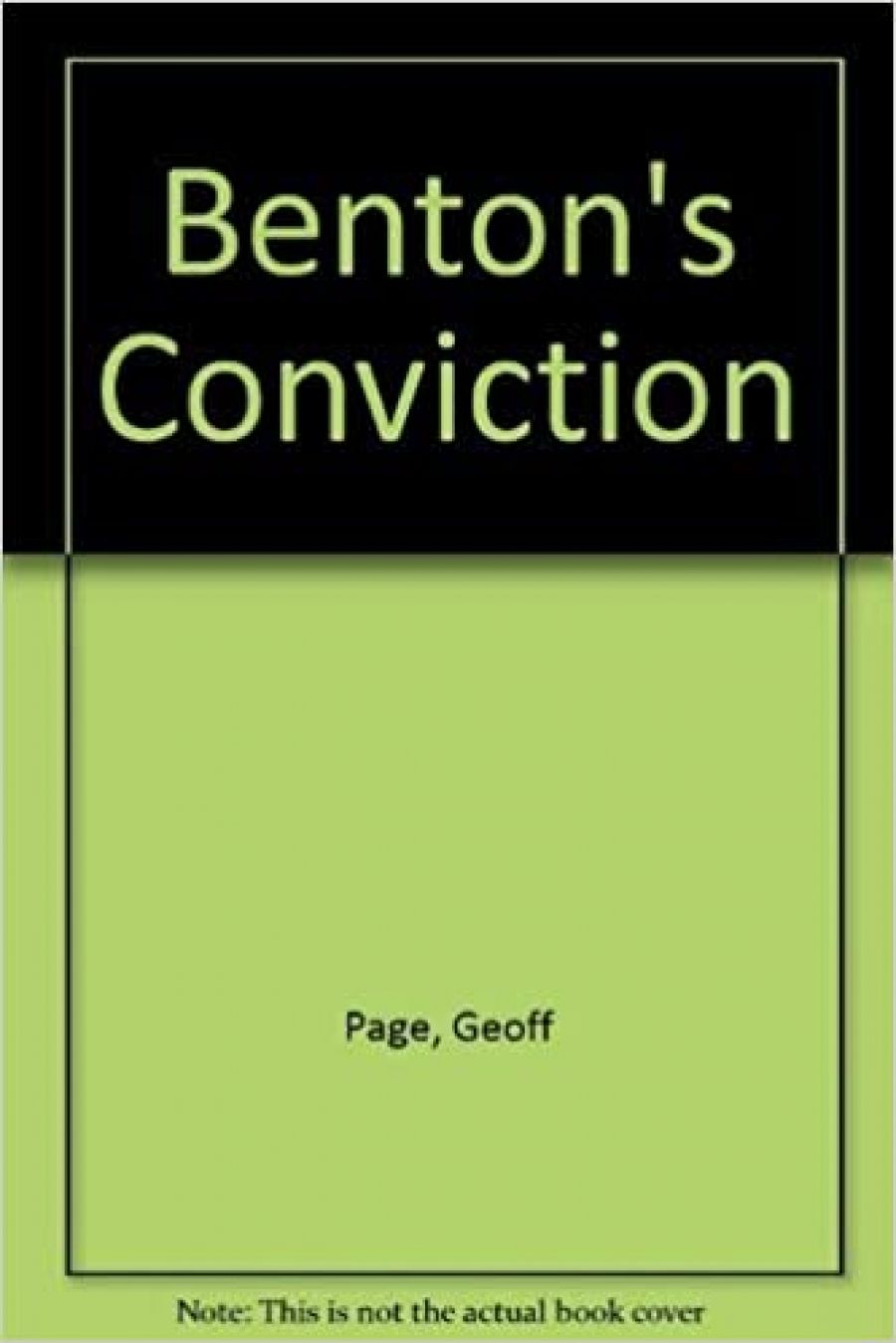
- Free Article: No
- Contents Category: Fiction
- Review Article: Yes
- Online Only: No
- Custom Highlight Text:
Australian involvement in World War I has in recent years attained a high profile in books, film and television. The trend has been to demythologise the legends of heroism and courage associated with war, and the theme often adopted is the rapid and brutal transformation from naivety to understanding of how baseless the myth was. Although this might be considered well covered ground, Geoff Page in his first novel, Benton’s Conviction, has returned to the war setting. However, because he concentrates on an aspect which hitherto has not been fully explored, and sustains the work with deft prose, Page has succeeded in producing a novel of originality and consistent interest.
- Book 1 Title: Benton’s Conviction
- Book 1 Biblio: Angus & Robertson, 175 pp, $14.95
But between the safe sentiments Benton delivers each Sunday, and his true feelings, there is a growing void, around which his conviction condenses. It is not so much Benton’s antiwar feeling that develops this is present from the outset as his ability to express it. The novel revolves around the consequences of his conviction that the establishment is wrong.
From this description, it is clear that the war is not the scene of any of the action. It has the role, for readers as for the inhabitants of Geradgery, of a distant, looming presence, manifested by lists of the dead in the newspapers, by telegrams which Benton must deliver, never quite sure what to say. Page has more subtle ways of evoking the horror of war than by graphic battle scenes. At the end of all carnage, there is a mother or father opening a door to bad news, a telegram expressing the regret of the Ministry of Defence, and it is on this aspect of personal grief, and the ironic incongruity of a population supporting the war which is taking away their sons, that Page dwells.
The nebulous presence of the war is opposed to the precisely described Australian landscape in which the novel is set. Apart from a brief excursion to Sydney, and Benton’s visits to the bishop in Armidale, the scene of the novel is Geradgery and environs. In every description of the town a feeling of somnolence and inertia is conveyed.
[Benton] felt on his skin, as much as he saw with his eyes, the winter sun on the gravel street, the stripped trees, the dampness in the gutters. As he looked northwards over the town, woodsmoke bent slightly south towards him.’ In the slanted overlapping red and grey roofs, in the faint blue morning haze, in the soiled white gravel of the streets there was that same perfection of imperfect parts he had noticed before and that inertia, that contentment, which was part of it too.
This ease and contentment the contentment of those who do not know how fortunate they are pervades descriptions of Geradgery and the implication is that it reflects the general attitude of the majority of Australians at the time. Page offers this characteristic as explaining why Australians so cheerfully poured their sons into a war in a foreign land. This inert unquestioning attitude was necessary to maintain the balance between acceptance of the war and all the evidence which suggested that the war should not be accepted. Benton is therefore vilified for daring to disturb that balance, for suggesting that the evidence the reports in the papers, the rolls of the dead, the individual tragedy accompanying each telegram outweighs all other considerations.
The other major focus is Benton himself. He must be included in the inertia that he senses in the extract above, yet he perceives it because he has just been engaged in destroying his own peace. Benton’s conviction is made concrete when he writes, for the second time, a sermon against war. ‘Benton could almost feel the subtle movement of one phase of his life giving way to another, a moment of sadness and apprehension equally mixed.’ The novel dwells upon the consequences of this action ostracism within the parish and retaliation from the church’s establishment, but also upon the resultant personal grapplings Benton has with his faith. Once Benton is jolted out of his easeful life by the war, the Church fails him. It should be added that Page is not showcasing theological abstractions Benton’s efforts are those of someone trying to come to a personal understanding of Christian ideals, in a time in which such ideals are in danger of becoming meaningless.
At almost all points, the novel is sustained by its fluid prose. Page seems able to bring the ear of the poet to his prose, an outstanding feature being his ability to create the right tone for any situation. This sureness only deserts him in certain passages of dialogue. Some of the vocabulary seemed inappropriate to the character speaking it, and at other times, the dialogue seemed to impede rather than facilitate the pace. But these points did not detract from a novel which was otherwise a pleasure to read.


Comments powered by CComment